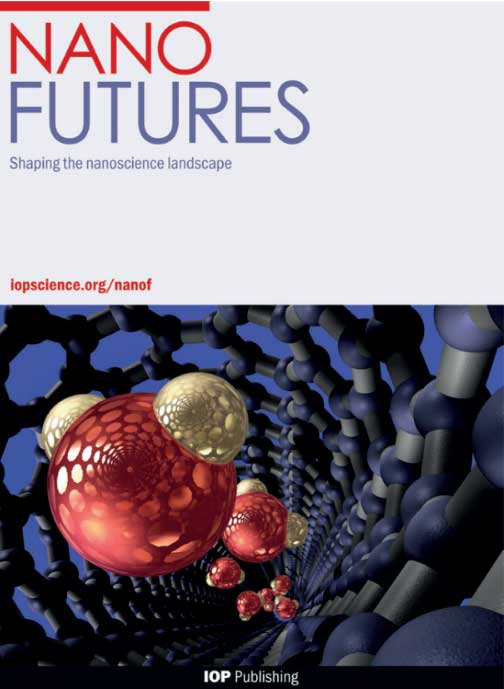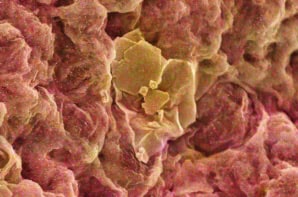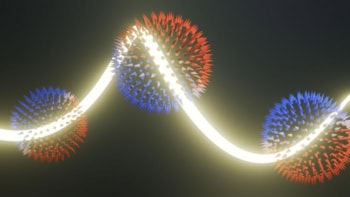Available to watch now, IOP Publishing’s journal, Nano Futures, explores the rapidly progressing field of intelligent nanotechnology
Want to learn more on this subject?

In recent years there have been several technological and scientific developments made possible due to the convergence between machine learning and physics at the nanoscale. This webinar examines this rapidly progressing field of ‘intelligent nanotechnology’ and brings together four leading researchers from within it.
During the webinar, hosted by Nano Futures, we will learn about some of the most recent developments and breakthroughs that are taking place, the projected direction that the field may take into the future, and the most critical challenges currently posed.
Want to learn more on this subject?

Keith Brown, Boston University, USA
Presentation: Towards closed-loop materials discovery at the femtogram scale using scanning probes
Keith A Brown is an associate professor of mechanical engineering, materials science & engineering, and physics at Boston University. The KABlab studies approaches to accelerate the development of advanced materials and structures with a focus on polymers. The group employs self-driving labs, additive manufacturing, scanning probe techniques, and machine learning to achieve these goals. Keith has co-authored more than 100 peer-reviewed publications and has six issued patents. Keith has received the Frontiers of Materials Award from The Minerals, Metals, & Materials Society (TMS), been named a “Future Star of the AVS”, and received the Omar Farha Award for Research Leadership from Northwestern University. Keith served on the Nano Letters Early Career Advisory Board, co-organized a National Academies of Science, Engineering, and Medicine Workshop on AI for Scientific Discovery, and currently leads the MRS Artificial Intelligence in Materials Development Staging Task Force.
Sergei Kalinin, The University of Tennessee, Knoxville, and Pacific Northwest National Laboratory, USA
Presentation: Physics and structure-property relationship discovery via automated scanning probe microscopy
Sergei V Kalinin is the Weston Fulton Professor at the University of Tennessee in Knoxville, and chief scientist for ML/AI for physical sciences at Pacific Northwest National Laboratory. His research interests include machine learning for materials discovery and optimization, direct atomic assembly via electron beams, the applications of machine learning and artificial intelligence for physics extraction from the atomically resolved and mesoscopic imaging data, and coupling between electromechanical, electrical, and transport phenomena on the nanoscale. He is a recipient of numerous awards, including Medard Welch Medal of ACS (2023) and Blavatnik National Awards for Young Scientists (2018). Sergei has published more than 700 peer-reviewed journal papers, edited four books, and is the holder of more than 10 patents. Sergei has organized numerous symposia worldwide, acts as consultant for companies such as Intel and several scanning probe microscopy manufacturers, and sits on the editorial boards of numerous international academic journals.
Amanda Barnard, Australian National University, Australia
Presentation: Interpretable features, influential instances and explainable machine learning models for nanoscience and technology
Amanda Barnard is one of Australia’s most highly awarded computational scientists. She currently leads research at the interface of computational modeling, high-performance supercomputing, and applied machine learning and artificial intelligence (AI). She was awarded her BSc (Hons) in applied physics in 2000, her PhD in theoretical condensed matter physics in 2003, and DSc in 2020 from RMIT University. With more than 20 years’ experience in high-performance computing and computational modeling and informatics, Amanda sits on boards for various institutions. She has been recognized for leadership and has been awarded in five scientific disciplines. She is a fellow of the Australian Institute of Physics (FAIP), the Royal Society of Chemistry (FRSC), and in 2022 was appointed a Member the Order of Australia (AM). Amanda is the current editor-in-chief of Nano Futures and her current research interests include applied machine learning and artificial intelligence, data science and eResearch and high-performance computing.
Yaroslava Yingling, North Carolina State University, USA
Presentation: Towards data fusion in materials science: bridging simulations and experiments with data science
Kobe Steel Distinguished Professor, Yaroslava G Yingling is an associate department head, University Faculty Scholar, and director of undergraduate programmes. She received her university diploma in computer science and engineering from St Petersburg State Technical University of Russia and her PhD in materials engineering and high-performance computing from the Pennsylvania State University in 2002. She carried out postdoctoral research at Penn State University chemistry department and at the National Institutes of Health National Cancer Institute, prior to joining North Carolina State University in 2007. She is an editor for the Springer Journal of Materials Science and an editorial board member of ACS Biomaterials Science and Engineering and ACS Applied Materials and Interfaces. She received the National Science Foundation CAREER award, and the American Chemical Society Open Eye Young Investigator Award, and was named an NC State University Faculty Scholar. She was inducted into the NC State Research Leadership Academy in 2021 and received NC State Alumni Association Outstanding Research Award.
Nano Futures is a multidisciplinary, high-impact journal publishing fundamental and applied research at the forefront of nanoscience and technological innovation.
Editor-in-chief: Amanda Barnard, senior professor of computational science and the deputy director of the School of Computing at the Australian National University.





